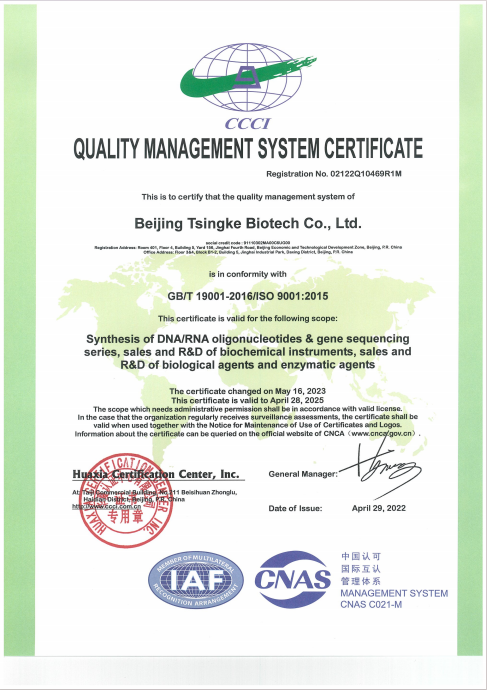Recently, with the successful application of mRNA vaccines, mRNA technology has rapidly emerged in various research and industrial fields. Katalin Karikó and Drew Weissman were awarded the 2023 Nobel Prize in Physiology or Medicine for their discoveries related to nucleoside modifications that contributed to the development of the COVID-19 mRNA vaccine.
mRNA technology can be categorized into non-replicating mRNA (linear mRNA), self-amplifying RNA (saRNA), and circular RNA (circRNA), collectively referred to as IVT (in vitro transcribed) mRNA. As a highly programmable and flexible tool, the application of IVT mRNA has expanded from basic research to broader clinical and industrial fields, driving innovative breakthroughs in gene therapy, drug development, and vaccine design.
Main Application Scenarios of IVT mRNA
1. Basic Research:
Gene Function Studies: IVT mRNA is used to express specific genes to explore their functions and related signaling pathways.
CRISPR Gene Editing: By co-delivering Cas9 mRNA and sgRNA to target cells, mRNA-mediated CRISPR gene editing can accelerate the gene editing process.
Protein Production: Rapidly synthesize and purify specific proteins in vitro systems, facilitating structural biology and drug screening.
2. Vaccine Development:
Infectious Disease Vaccines: IVT mRNA vaccines have achieved success in COVID-19 vaccine development due to their rapid design and production capabilities. With changing market demands, research has expanded to vaccines for respiratory syncytial virus (RSV), influenza, Zika virus, and more, demonstrating the broad application prospects of mRNA technology against various viral challenges. Moreover, the flexibility of mRNA vaccines enables rapid adaptation to viral mutations, enhancing public health response capabilities and providing new possibilities for future vaccine development.
Cancer Vaccines: By encoding tumor antigens, mRNA induces immune responses targeting specific tumor types (e.g., solid tumors, HPV-related tumors) to facilitate cancer treatment or prevention. The flexibility of mRNA technology allows customization of vaccines based on specific tumor characteristics, enhancing therapeutic effects. Researchers are also exploring mRNA applications in other cancer types, such as melanoma and breast cancer, to expand its potential in tumor immunotherapy.
3. Cancer Immunotherapy: IVT mRNA not only applies to cancer vaccines but also plays a significant role in other cancer immunotherapy mechanisms. For instance, IVT mRNA can generate specific antigens to engineer patient CAR-T cells for more effective recognition and attack of cancer cells. Additionally, IVT mRNA can encode cytokines (e.g., IL-2, IL-12) to increase immune cell proliferation and activity, enhancing immune responses to cancer. This approach can improve overall therapeutic effects, complementing other treatment modalities.
4. Gene Therapy:
Protein Replacement Therapy: IVT mRNA serves as a medium for gene expression, temporarily replacing defective genes or supplementing missing functional genes, making it a vital tool in gene therapy research. By delivering specific mRNA sequences, researchers can correct genetic defects or restore normal protein functions, providing new treatment avenues for genetic and metabolic disorders.
Immunotherapy: Guides T cells to produce specific cytokines, enhancing immune responses to treat tumors or viral infections.
5. Other Applications:
Cell Reprogramming and Regenerative Medicine: IVT mRNA can induce cell reprogramming to generate pluripotent stem cells or specific functional cell types, promoting the advancement of regenerative medicine.
CAR-T Cell Therapy: Directly encoding CAR using IVT mRNA simplifies the gene modification process of T cells, reducing potential risks associated with viral vectors, and may enhance cell functionality and persistence.
Antibody Drugs: IVT mRNA can be used to produce therapeutic monoclonal antibodies, rapidly generating antibodies against specific diseases (e.g., cancer, autoimmune diseases).
Cutting-Edge Research Directions and Industry Transformation
Research on IVT mRNA is rapidly expanding, driving progress in personalized medicine, including customized vaccines and gene editing therapies. Researchers are combining immunotherapy with mRNA technology to develop combination therapies that enhance cancer treatment outcomes. Furthermore, saRNA, with its ability to self-amplify within cells, can reduce initial dosing and extend efficacy, particularly showing broad application potential in vaccines and gene therapy. Compared to traditional linear mRNA, circRNA offers greater stability and longer expression duration, promising unique advantages in the treatment of complex diseases and providing new technological pathways for IVT mRNA synthesis. New delivery systems are also being developed to improve the stability and cellular uptake efficiency of mRNA.
The success of IVT mRNA vaccines has transformed traditional vaccine development models, significantly shortening research and development cycles and lowering costs. The biopharmaceutical industry is also transitioning toward mRNA technology, with increasing capital investment and collaboration driving industry mergers and innovation. Additionally, the evolution of policy and regulatory frameworks supports the development of mRNA technology, allowing for a reassessment of global health strategies to address future public health challenges.
Impact of IVT mRNA on the Industry
The widespread adoption of IVT mRNA synthesis technology is not only driving innovation in the biopharmaceutical industry but also changing the landscape of drug development. It significantly shortens the R&D cycle from the lab to the clinic, making the launch of new drugs and therapies more flexible and efficient. As more mRNA-based therapies enter clinical stages, IVT mRNA technology is expected to become a core force in advancing precision medicine and individualized treatment.
Tsingke Supporting Innovative Applications for Clients
As a leading enterprise in the field of DNA and RNA synthesis, Tsingke leverages its comprehensive gene synthesis supply chain and advanced IVT mRNA synthesis platform to meet diverse needs from small-scale research to large-scale production. We not only provide high-quality IVT mRNA synthesis services but also optimize sequences, select modifications, and customize delivery plans based on specific application scenarios, ensuring optimal performance in vaccine development, gene therapy, and other fields.
Through our reliable technology and flexible services, Tsingke is committed to offering clients one-stop IVT mRNA solutions, covering the delivery of linear, circular, and self-replicating RNA, helping you achieve breakthroughs in both research and industry.





